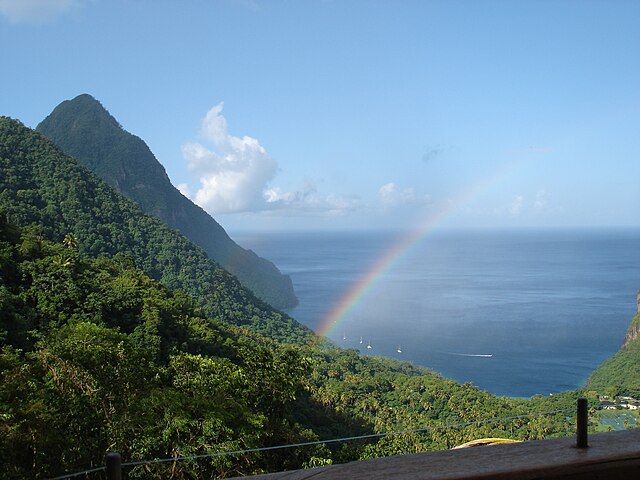Here’s an intriguing little fact that popped up on @HaggardHawks the other day:
ST. LUCIA is the only country in the world named after a woman. http://t.co/oLcpVgYaIF pic.twitter.com/65njVdQGaZ
— HaggardHawks Words (@HaggardHawks) September 23, 2015
This is actually (shameless plug #1) one of the choicer entries cherry-picked from the Haggard Hawks fact book, Word Drops. And although (shameless plug #2) you can find out more about it (shameless plug #3) in the award-nominated book, maybe all this deserves a bit more explanation here.
On a global scale, the etymologies of country names are a bit of mixed bag. Some are so straightforward that they require no explanation at all (we’re looking at you, United Kingdom). Some are named after their inhabitants (France = “the land of the Franks”), or their colonists or conquerors (Philippines = “islands of Philip II of Spain”). Some are more descriptive (Bahamas = “the shallows”, Bahrain = “two seas”), or more poetic (Luxembourg = “little castle”, Zimbabwe = “land of stones”). And some are just plain weird (Cameroon = “land of shrimp”).
St Lucia takes its name from Lucy of Syracuse, a third-century Italian saint (the patron saint of blindness and throat infections, no less) who was martyred during the Roman Emperor Diocletian’s persecution of the Christians in AD 304. Although the reasoning behind the name is unclear, we nevertheless know that it was chosen by the island’s first European explorers and settlers, the French, who arrived there in the early 1600s—although rumour has it that the island was being used as a base by French pirates long before then.
But according to the US Department of State, as of 2015 there are 195 countries (defined as “a people politically organized into a sovereign state with a definite territory recognized as independent”) in the world. Is it really true that only 0.51% of them are named after women?
Unfortunately, yes—although there are a couple of very close calls.
Unfortunately, yes—although there are a couple of very close calls.
One of the most famous almost-but-not-quites is the Republic of Ireland. Both Ireland and its Irish equivalent Éire derive from Eiru, the name of a goddess of the land and sovereignty in Celtic mythology. On a similar theme, one theory claims that Tunisia takes its name from Tanith, a Phoenician goddess of the moon who, with her husband Baal-Hammon, was the principal deity of the ancient city of Carthage.
But as far as eponymous women on our list of 195 countries go, that really is it: if we exclude all the ancient mythological and supernatural beings, St Lucia really is the only country named after a woman. Although, as a handful of astute followers noted, there is one final possibility:
Can we add St Helena to our list? Well, the problem here is that St Helena is officially classed as just one-third of a British Overseas Territory known as St Helena, Ascension and Tristan da Cuhna—the collective name for a clutch of British-controlled islands in the South Atlantic Ocean. And so long as we’re limiting our list to independent countries, St Helena just doesn’t fit the bill.
@HaggardHawks @IMcMillan Does St Helena count? pic.twitter.com/mxYACQsmug
— Steve (@SteveTrees) September 23, 2015
@HaggardHawks @IMcMillan St Helena? Island I know but....?
— Alastair McWhirter (@exexcc) September 23, 2015
St Helena is a tiny 50 square-mile volcanic island in the South Atlantic, home to around 4,500 people. It takes its name from St Helena of Constantinople (the patron saint of difficult marriages, should you need one), who was the wife of Constantinus Chlorus, ruler of the Western Roman Empire from AD 293-306. Can we add St Helena to our list? Well, the problem here is that St Helena is officially classed as just one-third of a British Overseas Territory known as St Helena, Ascension and Tristan da Cuhna—the collective name for a clutch of British-controlled islands in the South Atlantic Ocean. And so long as we’re limiting our list to independent countries, St Helena just doesn’t fit the bill.
So it seems St Lucia it seems really is the only country in the world named after a woman. But, hey—it could be worse:


repliche moncler giacche, che unisce stile elegante e tecnologia all'avanguardia, una varietà di stili di repliche moncler bambini giacche, il puntatore cammina tra il tuo stile di gusto esclusivo.
ReplyDeleteSt. Lucia—a true Caribbean paradise with breathtaking beaches, lush rainforests, and the stunning Pitons! Whether you're exploring the island’s rich culture, relaxing by the ocean, or indulging in delicious local cuisine, St. Lucia is the perfect escape. And if you’re looking to bring that island chill wherever you are, use a Weedmaps promo code to save on your favorite cannabis products—because nothing pairs better with paradise vibes than pure relaxation.
ReplyDelete